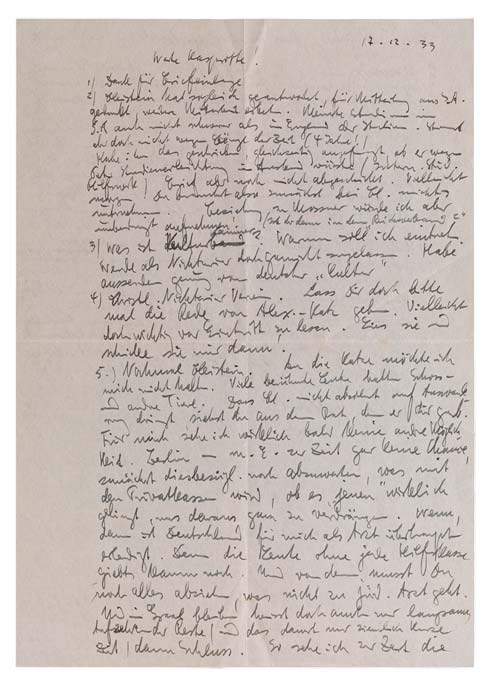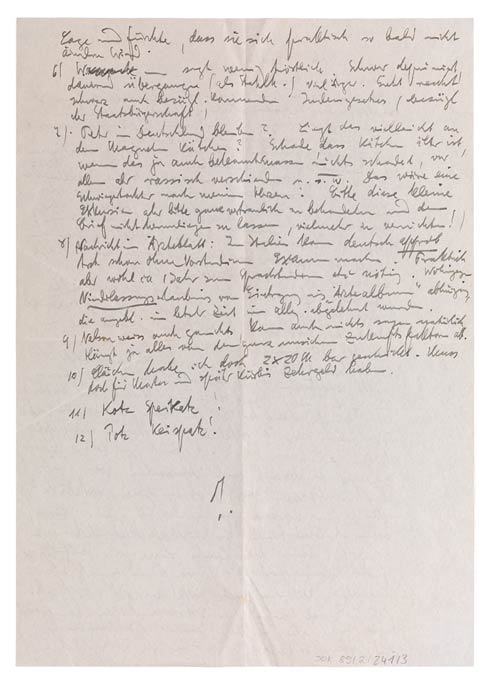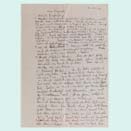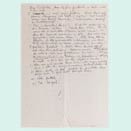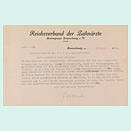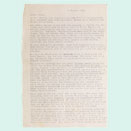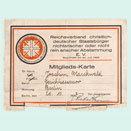"Berlin—in my view no chance at all at this time; for now must wait to see what happens with the private health insurers, whether 'they' [the Nazis] really succeed in pushing us out." This sentence in a letter written on 17 December 1933 by Julius Salinger to his brother-in-law Otto Kasper Arendt reveals something of the concern the writer felt about his situation.
Salinger was a physician who ran a sanatorium "for internal and nervous diseases." In April of that year, because he was Jewish, the forty-nine-year-old had already lost the accreditation required to charge the statutory health insurance scheme for his services. Moreover, private health insurers now only paid his bills when he treated "non-Aryans." These measures instituted by the National Socialist regime made the situation of Jewish physicians extremely difficult. As Julius Salinger goes on to write in his letter: "If this proves the case, then Germany is finished for me as a physician. There are hardly any people left without health insurance. And among those you have to subtract the ones who do not go to Jewish doctors."
Salinger was therefore considering emigrating and, as he wrote to his brother-in-law, he had already looked into the prospects of employment in different countries. The two men had obviously also discussed the Reich Union of Christian German Citizens of Non-Aryan or Not Purely Aryan Descent. In his letter, Salinger asks Arendt to send him a speech by the association‘s deputy chairman, Günther Alexander-Katz—"perhaps important to read before becoming a member."
Julius Salinger emigrated four years later. His name can be found with his daughter‘s on the passenger list of a ship that sailed from London to Cape Town in 1936. It seems he had to leave Germany because he had treated children free of charge. A number his relatives also managed to flee to South Africa.
The non-Jewish architect and sculptor Otto Kasper Arendt married Salinger‘s sister Elisabeth in 1929. She was also a sculptor. Unlike her husband, she was refused membership in the Reich Chamber of Culture in April 1935, which was the equivalent of an occupational ban. The reason given was that "you are a non-Aryan and as such do not exhibit the suitability or reliability required for the creation of German cultural assets." This explanation was followed by the unequivocal statement: "I hereby forbid you from continuing to pursue sculpture as a profession."
Elisabeth and Otto Kasper Arendt also managed to immigrate to South Africa prior to the outbreak of the Second World War.
Michaela Roßberg
17 December 33
Dear Kasperotto!
1) Thanks for the letter enclosure
2) Bleistein answered immediately, thanked for information about South Africa, requested further collaboration. Said studying in South Africa not any more difficult than in England or Italy. But not true in terms of the duration (four years!)
Wrote this to him and asked with reference to Peter whether he knew of reduced study requirements abroad (Intern. Stud. Assistance) [Peter is Julius Salinger‘s son]. Letter not yet sent. Perhaps tomorrow. So for the moment you don‘t have to do anything with regard to Bl. But I would definitely get in contact with Mossner! (Is he in the "Reich Association?")
3) What is the Chamber of Culture? Why should I join? As a non-Aryan wouldn‘t be admitted. Besides, have had enough of German "culture."
4) Christian non-Aryan association. Please get hold of the speech by Alex.-Katz [Günther Alexander-Katz]. Perhaps important to read before becoming a member. Read it and then send it on to me!
5.) Bleistein again. I would not like to rely on the cat. Many famous people had pets and other animals. The fact that Bl. is not absolutely pressing for emigration is clear from the advice he gave you. For myself I see no other possibility. Berlin—in my view no chance at all at this time; for now must wait to see what happens with the private health insurers, whether "they" [the Nazis] really succeed in pushing us out. If this proves the case, then Germany is finished for me as a physician. There are hardly any people left without health insurance. And among those you have to subtract the ones who do not go to Jewish doctors. Staying in Graal means slowly getting what you can from the rest (which will only take a relatively short time) and then that will be the end.
(page 2)
At the moment that‘s how I see things and fear the situation is unlikely to change any time soon.
6) W. said nothing of much comfort. Very depressed, continually passed over (as a Stahlhelm), lots of problems. Very grim outlook, particularly with respect to imminent anti-Jewish law (in terms of citizenship).
7). Peter staying in Germany? Does this have anything to do with the magnetic pull of Kätchen? A pity that Kätchen is older, even though as we know that does no harm. The key point is her different race, etc. She would be a daughter-in-law after my own heart! But please keep these remarks absolutely confidential and don‘t leave the letter lying around. Better still, destroy it!
8) Notice in the medical journal: in Italy a physician licensed in Germany can do the exams without requiring prior study. But in practical terms it would probably mean about a year learning the language. On the other hand, residence permit dependent on entry in the "physicians‘ registry," which apparently has generally been refused of late.
9) Nelson also knows nothing and can‘t say anything; of course, everything depends on very uncertain future developments.
10) I‘ve sent Clärchen 2×20 marks in cash ….
11) Kotz Speikatz!
12) Potz Keispatz!
J.
